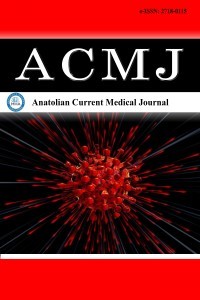1.
Bohr A, Memarzadeh K. The rise of artificial intelligence inhealthcare applications. Artificial Intelligence Healthc. 2020;1:25-60. doi: 10.1016/B978-0-12-818438-7.00002-2
2.
Basu K, Sinha R, Ong A, Basu T. Artificial intelligence: how isit changing medical sciences and its future? Indian J Dermatol.2020;65(5):365-370.
3.
OpenAI. ChatGPT Release Notes. 2021. https://help.openai.com/en/articles/6825453-chatgpt-release-notes. Accessed March21, 2023.
4.
Mese I, Taslicay CA, Sivrioglu AK. Improving radiologyworkflow using ChatGPT and artificial intelligence. Clin Imaging.2023;103:109993.
5.
Sallam M. ChatGPT utility in healthcare education, research, andpractice: systematic review on the promising perspectives andvalid concerns. Healthcare. 2023;11(6):887.
6.
Homolak J. Opportunities and risks of ChatGPT in medicine,science, and academic publishing: a modern Prometheandilemma. Croat Med J. 2023;64(1):1-3.
7.
Khan RA, Jawaid M, Khan AR, Sajjad M. ChatGPT - reshapingmedical education and clinical management. Pak J Med Sci.2023;39(2):605-607.
8.
Else H. Abstracts written by ChatGPT fool scientists. Nature.2023;613(7944):423.
9.
Temsah O, Khan SA, Chaiah Y, et al. Overview of earlyChatGPT’s presence in medical literature: insights from a hybridliterature review by ChatGPT and human experts. Cureus.2023;15(4):e37281.
10.
Ray PP. ChatGPT: a comprehensive review on background,applications, key challenges, bias, ethics, limitations and futurescope. Internet Things Cyber-Physic Sys. 2023;3:121-154.
11.
Liebrenz M, Schleifer R, Buadze A, Bhugra D, Smith A. Generatingscholarly content with ChatGPT: ethical challenges for medicalpublishing. Lancet Digit Health. 2023;5(3):E105-E106.
12.
Kallestinova ED. How to write your first research paper. Yale JBiol Med. 2011;84(3):181-190.
13.
Colthorpe K, Mehari Abraha H, Zimbardi K, et al. Assessingstudents’ ability to critically evaluate evidence in an inquiry-based undergraduate laboratory course. Adv Physiol Educ.2017;41(1):154-162.
14.
Lerchenfeldt S, Mi M, Eng M. The utilization of peer feedbackduring collaborative learning in undergraduate medicaleducation: a systematic review. BMC Med Educ. 2019;19(1):321.
15.
Groves T. What makes a high quality clinical research paper?Oral Dis. 2010;16(4):313-315.
16.
Lee H. The rise of ChatGPT: exploring its potential in medicaleducation. Anat Sci Educ. 2023;00:1-6. doi: 10.1002/ase.2270.
17.
Shen N, Bernier T, Sequeira L, et al. Understanding the patientprivacy perspective on health information exchange: a systematicreview. Int J Med Inform. 2019;125:1-12.
18.
Garattini L, Padula A, Mannucci PM. Conflicts of interestin medicine: a never-ending story. Intern Emerg Med.2020;15(3):357-359.
19.
Kadam RA. Informed consent process: a step further towardsmaking it meaningful! Perspect Clin Res. 2017;8(3):107-112.
20.
Dobrow MJ, Miller FA, Frank C, Brown AD. Understandingrelevance of health research: considerations in the context ofresearch impact assessment. Health Res Policy Sys. 2017;15(1):31.
21.
Sinha RK, Deb Roy A, Kumar N, Mondal H. Applicabilityof ChatGPT in assisting to solve higher order problems inpathology. Cureus. 2023;15(2):e35237.
22.
Cherry MG, Fletcher I, O’Sullivan H, Dornan T. Emotionalintelligence in medical education: a critical review. Med Educ.2014;48(5):468-478.
23.
Marsh CA, Browne J, Taylor J, Davis D. A researcher’s journey:exploring a sensitive topic with vulnerable women. Women Birth.2017;30(1):63-69.
24.
Walls P, Parahoo K, Fleming P, Mccaughan E. Issues andconsiderations when researching sensitive issues with men:examples from a study of men and sexual health. Nurse Res.2010;18(1):26-34.
25.
Seghier M. Using ChatGPT and other AI-assisted tools toimprove manuscripts readability and language. Int J Imaging SystTechnol. 2023;33(3):773-775.
26.
Donmez I, Idil S, Gulen S. Conducting academic research withthe AI interface ChatGPT: challenges and opportunities. JSTEAM Educat. 2023;6(2):101-118.
27.
Kim SG. Using ChatGPT for language editing in scientificarticles. Maxillofac Plast Reconstr Surg. 2023;45(1):13.
28.
Salvagno M, Taccone FS, Gerli AG. Can artificial intelligencehelp for scientific writing? Crit Care. 2023;27(1):75.
29.
Smith R. Peer review: a flawed process at the heart of science andjournals. J R Soc Med. 2006;99(4):178-182.
30.
Chen PH. Essential elements of natural language processing:what the radiologist should know. Acad Radiol. 2020;27(1):6-12.
31.
Gao CA, Howard FM, Markov NS, et al. Comparing scientificabstracts generated by ChatGPT to real abstracts with detectorsand blinded human reviewers. NPJ Digit Med. 2023;6(1):75.
32.
Mese I, Altıntaş Taslicay C, Kuzan BN, Kuzan T, Sivrioglu AK.Educating the next generation of radiologists: a comparativereport of ChatGPT and e-learning resources. Diagn IntervRadiol. 25 December 2023 [Epub Ahead of Print]. doi: 10.4274/dir.2023.232496

